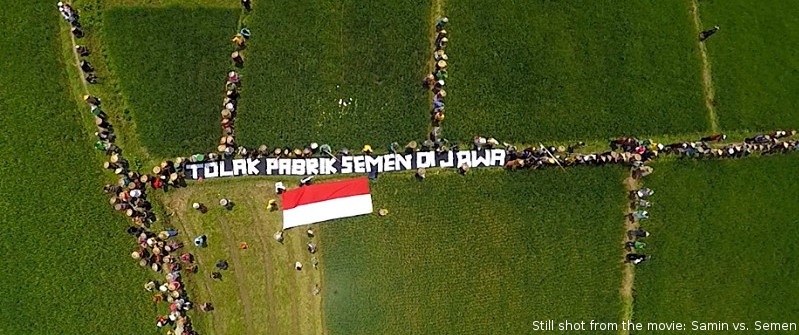
04 Dec Blog: From peasant to jurist?
Matthieu Pereira reflects on the role of law and the use of legal discourse in rural contexts. He introduces one of the issues he tackles in his doctoral research.
An other picture
While statements about the lack of the rule of law in Indonesia and the clientelistic working of its politics have become ubiquitous, I would like to paint a different picture.
A few days ago I received good news from north central Java, Indonesia where I conducted my fieldwork for my master’s thesis. From November 17 until November 20, 2015, hundreds of peasants from villages south of Pati City walked almost 150 km to reach the administrative court of Semarang (#MenjemputKeadilan). There, a trial was being held: peasants filed a case against a cement-producing company that was planning to build a cement factory and to dig a limestone quarry and clay pit in the area. The court ruled in favour of the plaintiffs[1]. This “long march” (as it was called) initiated by peasants and activists indicates two things, namely that there is a well-organized movement of resistance, and people do place their hope in a legal institution. The fact that the peasants and activists won this case will undoubtedly reinforce their belief in the possibility to obtain justice through state and legal institutions.
Law’s increasing presence
In other parts of Indonesia, banners of protest referencing legal texts can be seen hanging in remote rice fields. This phenomenon of rising legal awareness is owed in large part to the efforts of a range of advocacy NGOs and, in particular, legal aid associations. There is indeed evidence that the language of rights and legality is reaching out of urban areas and activist milieus and expanding into rural zones. Yet, simultaneously, law is perceived by the majority of ordinary people to protect those already with power. Prosecutors are seen as corrupt and legislators are often considered to pass laws that support private interests. So, on the one hand, there is a distrust of the law and its implementation. But, on the other hand, as illustrated above, the law is also perceived as a powerful weapon: a weapon of the weak. Remembering what a Pati activist once told me, “This is our only way to fight”.
Democracy from below?
What importance should be given to this observation? What is happening when people name or quote a law or a regulation to defend their opinion or criticize a situation they regard as unjust? Is this a sign of the emergence of a legal citizenship, that is, an engagement with (national) politics which recognizes the importance of law and which is based on the belief that justice is accessible through state institutions? These are some of the questions I will try to answer during my doctoral research. By analysing protest movements in Indonesia and Malaysia, I hope to get a better understanding of emergent forms of citizenship. I will especially explore to what extent the work of advocacy NGOs and legal advisers strengthens a civic spirit among marginalized people who otherwise often see the state apparatus as an alien power.
[1] The judges stated that the project did not involve the participation of people potentially affected. The construction permit was judged contradictory to the land planning of the area did not follow the principle of good governance.




No Comments